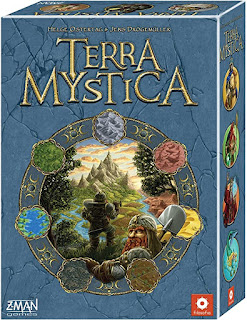In Terra Mystica, each player shepherds a fantasy culture through several rounds of building and expansion, converting terrain on a map to be hospitable to them, then growing their empire into the newly reformed area. I'll try not to get too deeply into the mechanisms; many of my readers already know the game, and it's not likely to make much sense to the rest without actually playing it. But I think I get why the game is popular. There are a lot of subtle elements to master within the gameplay.
One of your "currencies" is a group of power tokens that circulate through three "bowls" on a personal playmat. You charge up by progressing them through bowls one and two, and can only spend them from bowl three; managing this circulation is a bit trickier than it seems at first.
There are moments in the game where you're allowed to give up victory points you've scored to gain momentum for expanding your strategy. Knowing when it's right to do that -- and more importantly, when it's right to stop doing that -- is a key element of success.
Generally, resources are quite hard to accumulate relative to the variety of ways you can spend them. It's not unusual to have a slow round of gathering before you can take a big action next round. Judging how many of your resources you should save for later and how much you should spend now is yet another tricky moment of decision.
But to me, all of those seem like essentially "solvable" puzzles. I certainly haven't done so after just a couple of plays spread out over a decade; I imagine it would take many, many games in close proximity to to so. but it sure feels like there's one "best answer" to a lot of these questions, and not enough in the game that might change those answers.
There are random tokens used to give different scoring criteria in each of the game's five rounds... but there are other sources of scoring that seem to loom much larger in the design as a whole, comprising a bigger share of the final scores.
The game does have 14 different species you can play, each with different powers... and you will be encouraged to look at different strategies depending on which one you play. Yet it also feels like each one is so specialized that it will lock you into a certain way to play that's optimal for it. Who you are playing seems like a far more important consideration than the decisions made by your opponents. Your perfect progression of infrastructure decisions can't easily be disrupted enough by what others do.
Now, I will say: I'm overstating my argument a bit here, more in reaction to the idea that this is one of the Top 20 Board Games of All Time. It's not a bad game. And in as much as it does have 14 different species you could master, one by one, there is quite a bit of replayability here -- more than many games have. But playing it felt like a bit of a solitary exercise to me, one I'm not sure I'd feel rewarded enough to repeat that many times.
The less hyperbolic way to sum up would be that there are other games that to me scratch a similar itch while feeling more interactive. Hell, there's one that even starts with the same first five letters: Terraforming Mars (which is rated even higher on BoardGameGeek). I'd give Terra Mystica a B-. I would certainly play it again if someone else picked it; it just wouldn't be my personal choice.

No comments:
Post a Comment